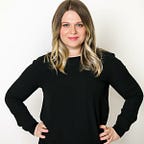I was 29 when I walked into my first classroom. I was hired as a long-term sub in an amazing school district, one of the top in the state. An affluent school district. A dream for many. I was just thrilled to have a teaching job.
I started in November. After the students had already developed rapport with their teacher. After they fell in love with her.
I was 29, with a child and a previous career in marketing and communications. I was “semi-seasoned,” in terms of professional experience. This was going to be fine. Everything was going to be fine.
On the first day, I was so nauseated I actually thought I had a stomach bug. Turns out, just nerves. I couldn’t believe I chose to do this. I couldn’t believe I would very shortly stand in front of 30+ kids and attempt to gain their respect enough to do my job, a job I’ve never done before. A job that suddenly terrified me.
So, I took a deep breath and I walked into the classroom, stood in the front, and greeted the students with a smile that hid my terror. Inside, every part of me screamed for help. Outside, I projected confidence and maturity. Basically, I faked it. I could have won an Academy Award. Within the first few weeks, I was cursed at, thrown a book at, made fun of, disrespected, questioned, and ignored. I cried alone in my classroom; I crawled and hid under my desk; cried to my mentor, to my friends, and at home. I cried at home a lot.
After several long-term sub gigs (2.5 years) in the district, I was worn down, chewed up, and spat out. I quit looking for teaching jobs. I decided this was not the career for me. (Spoiler alert: This was the career for me.)
My grandmother was a college professor. She taught chemistry to college freshmen. When I told her I was going to be a teacher, she sighed with great heaviness and then gave me some advice and a warning. The advice was to always be prepared and to always know my content area. “You must study all the time,” she said. “Kids are smarter than some think, they know when teachers don’t know what they are talking about; so, know your subject and know it well,” she advised. “And always strive to do better.”
The warning came as part of a story. “I survived WWII, lost my father and most of my family, nearly starved to death, raised myself, received a PhD in chemistry during a time when women, especially Jewish women, weren’t welcomed in higher education with open arms (to put it mildly), and still, teaching was the hardest thing I’ve done. You’ll be amazing, but you’ll be exhausted and stressed all the time,” she warned. “Are you sure you want to do this,” she asked.
So take it from my trailblazer grandmother, teaching is hard. Like, really, really hard. Especially, if you want to be great at it. Your work is never finished. You never stop thinking about your strategies, your students, your connections. It can be all-consuming. It takes every drop of you. Every ounce. When I left, I swore I’d never go back.
I came back. It needed me and I needed it. I just needed a different classroom and place to call home.
The most difficult time in teaching is that very first year. It’s even harder when you’re young and fresh out of college, when you don’t have the maturity yet, or the learned ability to fake it. The first year hurts physically and psychologically. It’s hazing. It’s embarrassing. It’s devastating. I started with two other first-year teachers, straight out of college. Many times, I walked in on one of them crying at his desk. He and I would sit together and cry together.
It got better. We found our footing. But we did it together and with the help of others in the building.
So, if I have any advice for new teachers it’s this: Find an ally in the building. Ask for help. Don’t lock yourself in a classroom and cry alone; find someone to cry with.
I was 29 and it was brutal. You’ll be okay, too. I promise.
